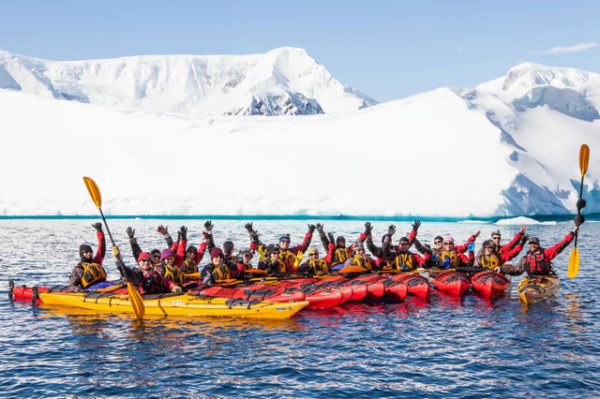
Are we on thin ice?
AboitizEyesThis article was initially featured in the Daily Tribune on April 8, 2024, as a segment of the weekly column titled “On the G(ood) Side,” authored by the Aboitiz Foundation’s President and Aboitiz Group’s FVP – Chief Reputation & Sustainability Officer.
Exploring the world teaches us many things. It was this sense of curiosity and adventure that brought me to Antarctica, the world’s most remote continent, a decade ago.
Surrounded by a vast, formidable ocean, the terrain and seascape elicit both awe and respect. Little did I know that Antarctica would become more than just a destination (and a once-in-a-lifetime personal experience) — it would yield important lessons about our relationship with the environment.
Lesson One: Resilience in the face of adversity
We took off from Ushuaia, the southernmost tip of Argentina, and launched into a crossing of the unpredictable Drake Passage. The two-day naval route rendered me totally bedridden and left me humbled by nature’s power. Yet, upon reaching Antarctica’s shores, I was greeted by its breathtaking beauty and an understanding of our planet’s fragile equilibrium.
Antarctica is home to some of our planet’s most tenacious and resilient creatures (and my favorite species): Penguins. Their capacity to survive in such extreme conditions of frigid seas and unpredictable weather demonstrates the power of adaptation.
And as I kayaked through the cold seas, weaving through glacial ice and penguin territory, the contrast between such power and fragility made me think about our world in its precarious state.
Just as Antarctica’s creatures have adapted, we, too can implement measures to promote resilience. The Antarctic Treaty System, for example, identifies protected areas and promotes international cooperation to reduce environmental impact and safeguard fragile ecosystems.
Lesson 2: Ecosystem interconnectivity
In the bustling urban landscapes of the Philippines, it’s easy to overlook the interconnectedness of our world. However, this reality remains stark.
Antarctica is often viewed as a far-off frontier, far removed from our daily situations. The fact is it plays a vital role as the Earth’s “refrigerator” and the rapid thawing it is experiencing now has repercussions on a global scale. The past decade has shown us how rising sea levels threaten our already vulnerable coastal communities in the Philippines, where typhoons wreak havoc on lives and livelihoods.
The decline of Antarctic sea ice sets off a chain reaction. Exposed, dark water absorbs more heat, accelerating warming through the “ice-albedo feedback” mechanism. Antarctica’s melting ice now contributes to 12 percent of global sea-level rise, up from 4 percent, with hidden ice melting faster than anticipated. This once passive buffer against warming has become a catalyst for change, disrupting water currents and global weather patterns.
This trend is likely to continue, with hidden ice underlying the glaciers melting quicker than expected. Shifting water currents, which have already impacted Australia, will continue to upset world patterns. And rising oceans become less efficient at absorbing carbon dioxide, the major greenhouse gas.

Author in the purple beanie (3rd from left). Kayaking Antartica, 2014.Photograph by the Author for the Daily Tribune
Lesson 3: The battlefield is here
The lessons from Antarctica extend beyond its icy shores. While my journey to the southernmost continent provided a unique perspective, we all struggle against climate change and its effects.
In the Philippines, we experience firsthand the impacts of extreme weather events and rising temperatures. Recently, classes were disrupted due to severe heat indexes, a clear indication of the challenges ahead. Will office labor become untenable as temperatures rise? How will our homes and workplaces be affected? Which supply chains are at greater risk? How can we prepare for a world of continual extremes and adapt our way of life accordingly? Change requires us to handle the complex convergence of environmental and societal challenges.
Building hope for the future
Overcoming obstacles is inherent in the human spirit. We have the resources, technology and resilience to face the changing world head-on. While addressing climate change may appear intimidating or overwhelmed by thoughts of ‘I am just one person, what I do won’t matter,” doing nothing is simply Not an option. We must believe in ourselves and our common ability to prevail. Each of us can reduce carbon emissions by simply making mindful choices — walking, using mass transport or carpooling, shifting to e-vehicles, minimizing plastic consumption, etc. As a community, planting trees, composting, and embracing more ecological solutions are simple starters to mitigate our methane emissions. Taking an active interest in sustainability, reading and learning as much as we can, sharing best practices, bringing audacious new ideas to the table, and encouraging one another, all these contribute to a greater cause.
A thousand miles begins with one step. Together, these steps can have a collective impact. Antarctica leaves an indelible imprint on the minds of all who visit: a stark reminder of the consequences of inaction, yet also offering the brightest sense of hope.By learning from its fragile ecosystem and embracing our collective resolve, we can continue to co-create a more sustainable future.
We can rise to the challenge. After all, it’s never just for ourselves but, mainly, for those we love and the planet we all call home.
***
Ginggay Hontiveros-Malvar is the Chief Reputation and Sustainability Officer of the Aboitiz Group and president of Aboitiz Foundation. With over three decades of senior management experience, she has led projects focusing on stakeholder engagement and sustainability, reshaping the group’s agenda. A passionate artist and avid traveler, Ginggay finds inspiration in drawing, painting and exploring diverse cultures. Ginggay is a dedicated mother — not only to her two grownup daughters, but also as a mom to her three huskies, Olaf, Louis and Grizzly — who balances her dynamic career with personal joy and companionship. For any feedback and recommendations, please reach out directly to Ginggay at ginggay.hontiveros@gmail.com.
Read more at: https://tribune.net.ph/2024/04/07/are-we-on-thin-ice
Read more Daily Tribune stories at: https://tribune.net.ph/
Follow us on our social media
Facebook: @tribunephl
Youtube: TribuneNow
Twitter: @tribunephl
Instagram: @tribunephl
TikTok: @dailytribuneofficial
